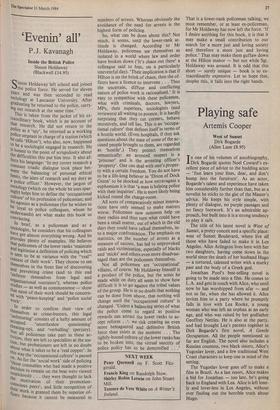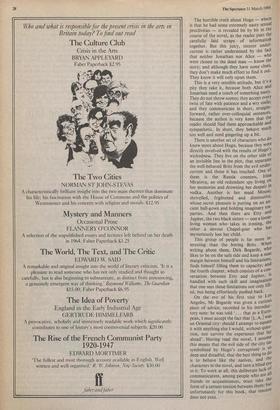Playing safe
Artemis Cooper
West of Sunset Dirk Bogarde (Allen Lane £8.95) I n one of his volumes of autobiography,
Dirk Bogarde quotes Noel Coward's ex- cellent piece of advice to the budding actor — 'Just learn your lines, dear, and don't bump into the furniture'. As an actor, Bogarde's talent and experience have taken him considerably further than that, but as a novelist he sticks to the gist of the Master's advice. He keeps his style simple, with plenty of dialogue, no purple passages and no fancy footwork. It's an admirable ap- proach, but built into it is a strong tendency to play it safe.
The title of his latest novel is West of Sunset, a pretty conceit and a specific place: west of Sunset Boulevard, where live all those who have failed to make it in Los Angeles. Alice Arlington lives here with her two daughters, having come down in the world since the death of her husband Hugo — a tortured, talented writer with a murky past and the body of a Greek god.
Jonathan Pool's best-selling novel is going to be made into a film. He comes to L.A. and gets in touch with Alice, who until now he has worshipped from afar — and not so far, when she has allowed it. Alice invites him to a party where he promptly falls in love with Lea Rooke, a young woman who was left an orphan at an early age, and who was raised by her godfather Geoffrey Nettles. He is also at the party, and had brought Lea's parents together in Dirk Bogarde's first novel, A Gentle Occupation. All the people mentioned so far are English. The novel also includes a Russian countess, two black sisters, Alice's Yugoslav lover, and a few traditional West Coast characters to keep one in mind of the setting.
The Yugoslav lover goes off to make a film in Brazil. As a last resort, Alice makes a bid for Jonathan — too late, he's going back to England with Lea. Alice is left lone- ly and lover-less in Los Angeles, without ever finding out the horrible truth about Hugo.
The horrible truth about Hugo — which is that he had some extremely nasty sexual proclivities — is revealed bit by bit in the course of the novel, as the reader puts the carefully laid scraps of information together. But this juicy, sinister under- current is rather undermined by the fact that neither Jonathan nor Alice — who were closest to the dead man — know the story; and although they have some clues, they don't make much effort to find it out. They know it will only upset them. This is a very sensible attitude, but it's a pity they take it, because both Alice and Jonathan need a touch of something nasty. They do not throw scenes; they accept evcrY twist of fate with patience and a wry smile; and they communicate in short, straight- forward, rather over-colloquial sentences, because the author is very keen that the reader should find them approachable and sympathetic. In short, they behave much too well and need gingering up a bit. There is another set of characters who do know more about Hugo, because they were directly involved with the results of Hugo 's wickedness. They live on the other side of an invisible line in the plot, that separates the well-behaved Brits from the evil under- current and those it has touched. One of them is the Russia countess, Irina Miratova, an old redundant spy living on her memories and drowning her despair in vodka. Another is her maid Mouse' shrivelled, frightened and diminutive, whose secret pleasure is putting on an an- cient ball-gown and holding imaginary tea- parties. And then there are Etty and Jupiter, the two black sisters — one a loose- living woman who takes in ironing, the other a devout Chapel-goer who has mysteriously lost her child. This group of people is far more in- teresting than the boring Brits. When writing about them, Dirk Bogarde, who likes to be on the safe side and keep .a neat margin between himself and his limitations, finds himself filling them to capacity; and the fourth chapter, which consists of a con- versation between Etty and Jupiter. is handled with such skill and imagination that one sees those limitations not only fill- ed, but being effortlessly pushed back. On the eve of his first visit to Los Angeles, Mr Bogarde was given a curious piece of advice, recorded in his introduc- tory note: he was told `... that as a Euro- pean, I must accept the fact that [L.A.] was an Oriental city: should I attempt to equate it with anything else I would, without ques- tion, not survive the experience that lay ahead'. Having read the novel, I assunle this means that the evil side of the city (as symbolised by Hugo's corruption) is so deep and dreadful, that the best thing to do is to behave like the natives, and the characters in the novel, and turn a blind eye to it. To work at all, this deliberate lack olft
communication, among people who are a friends or acquaintances, must take the form of a certain tension between them: but unfortunately for this book, that tension does not exist.















































 Previous page
Previous page